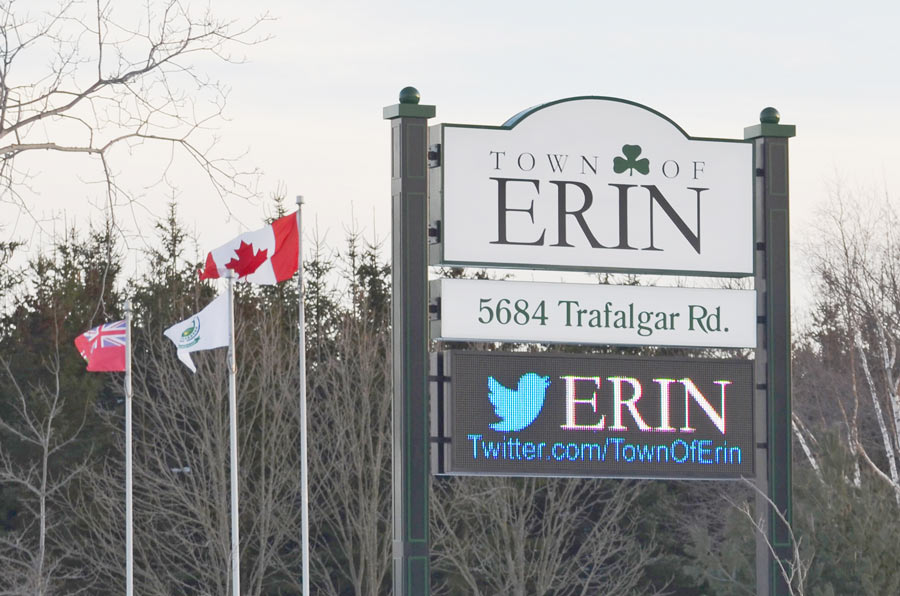ERIN – Council adopted its 2020 budget on Dec. 17 with a 2% tax increase and a cost of living pay increase of 1.9% for town staff.
The pay hike was approved unanimously after a brief closed session.
Council approved $12.9 million for the 2020 operating budget and $4.1 million for the capital budget. The 2% tax increase will mean an additional $29.87 on the tax bill of a home assessed at $500,000, to be combined with possible increases for county and education needs.
“The 2020 budget allows us to continue to invest in the community through enhancements to the recreation facilities, town infrastructure and the roads network, while continuing to find cost-saving efficiencies and providing service excellence,” said mayor Allan Alls.
“Council and staff are effectively planning for the future of Erin.”
Council made a last-minute change, adding $7,000 to the roads budget at the request of councillor Mike Robins to cover four snow removals each winter in the downtown areas instead of the current three.
“The bottom line is to support economic prospects and tourism, and improve safety,” said Robins.
In addition to regular downtown snow plowing of the road by the county and the sidewalks by the town, a contractor is also hired for periodic snow removal. The town can exceed its snow removal budget if needed, depending on actual conditions.
Other recent changes to the budget approved on Dec. 3 include an extra $10,000 approved for the roads department for speed control signs in Cedar Valley and other locations, and an extra $950 for the community grants budget.
To ensure the changes did not affect the plan for a 2% tax increase, a total of $17,950 less will be contributed to the infrastructure renewal reserve.
Council has changed its arrangement with East Wellington Community Services for the adult day program.
Previously, community centre space was considered as a $16,000 community grant, which showed up as $16,000 in revenue for the recreation department.
Now the grant has been cancelled, but EWCS will simply be allowed to use the space for free.
Council also adopted forecasts for 2021 to 2023 that will guide future budgets. Finance director Ursula D’Angelo is recommending tax increases of 2% in each of the following four years, but the final decisions will be made annually.
The town had a budget consultation period, including five public meetings, a budget survey and its first-ever telephone town hall.
Erin has adopted a “priority-based budgeting” approach, which allows the town to allocate budget dollars to match community priorities.
The budget includes priorities identified by the community through the newly adopted strategic plan; parks, recreation and culture master plan; economic development plan and 2020 budget process.
Budget highlights include a reduction of $31 for 1,940 urban properties currently paying the special area charge for streetlights, thanks to new LED lighting.
Renovations are planned at the Hillsburgh and Erin community centres, including emergency response equipment if a government grant is approved.
There will be a major culvert replacement at Station Street, replacement of a fire department tanker truck, energy and water conservation projects in all municipal facilities, and new equipment at town parks and parkettes.
There is funding to support growth and the wastewater system, including grant applications, financing agreements, official plan amendments, development of architectural design standards and the hiring of a senior planner.
There will be a storm water management study and mitigation strategy.
Funding will continue for businesses applying for property upgrade grants under the community improvement plan (CIP), with $40,000 allocated in 2020. Businesses must make significant investments of their own to qualify for the support.
New resource requests approved for town departments totalled $974,950, with $579,500 funded by reserves and $395,450 through taxation.
Residential taxpayers represent 86.2% of tax assessment, a figure the town hopes to lower with commercial and industrial growth related to wastewater.
The total assessed value of Erin homes has increased 4.98%, including 1.55% related to new building permits.
The assessed value of managed forests is up 13.72% and farmland is up 11.5%.
Town debt will be at $3.6 million as of January 2020, which does not include borrowing for up to $2.5 million previously arranged for the Station Street bridge and dam.
Much of that will not be needed, but the exact amount will not be known until negotiations with the county and nearby land developers are completed.
The town has not approved new debt for 2020.




